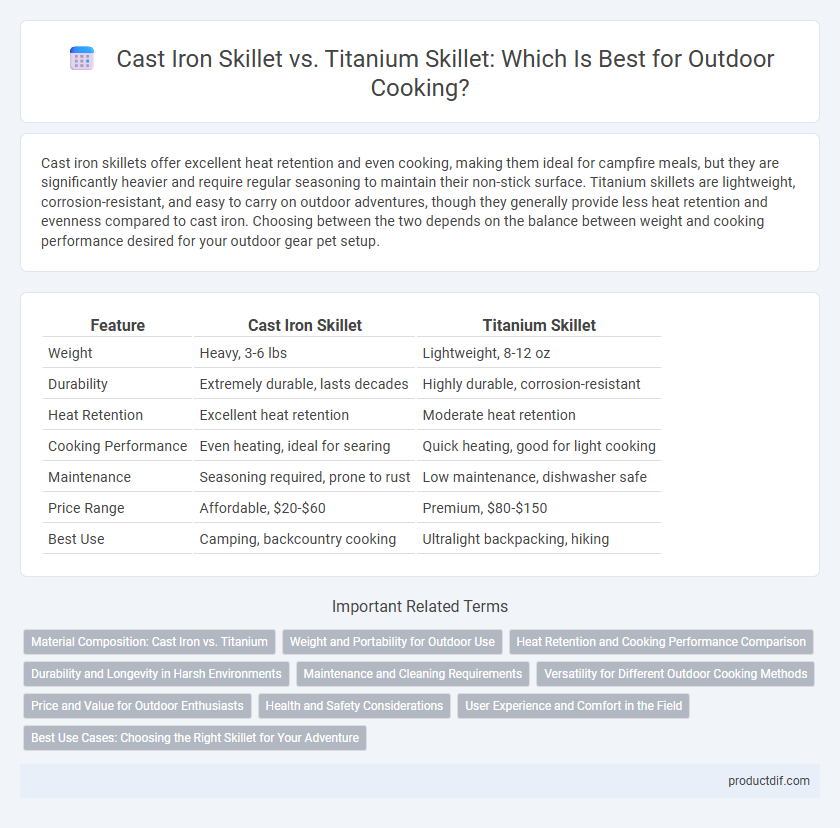Cast iron skillets offer excellent heat retention and even cooking, making them ideal for campfire meals, but they are significantly heavier and require regular seasoning to maintain their non-stick surface. Titanium skillets are lightweight, corrosion-resistant, and easy to carry on outdoor adventures, though they generally provide less heat retention and evenness compared to cast iron. Choosing between the two depends on the balance between weight and cooking performance desired for your outdoor gear pet setup.
Table of Comparison
| Feature | Cast Iron Skillet | Titanium Skillet |
|---|---|---|
| Weight | Heavy, 3-6 lbs | Lightweight, 8-12 oz |
| Durability | Extremely durable, lasts decades | Highly durable, corrosion-resistant |
| Heat Retention | Excellent heat retention | Moderate heat retention |
| Cooking Performance | Even heating, ideal for searing | Quick heating, good for light cooking |
| Maintenance | Seasoning required, prone to rust | Low maintenance, dishwasher safe |
| Price Range | Affordable, $20-$60 | Premium, $80-$150 |
| Best Use | Camping, backcountry cooking | Ultralight backpacking, hiking |
Material Composition: Cast Iron vs. Titanium
Cast iron skillets are made from solid iron, offering superior heat retention and even cooking, ideal for outdoor searing and frying. Titanium skillets consist of a lightweight titanium alloy, prized for corrosion resistance, durability, and ease of transport during backpacking. While cast iron provides robust thermal performance, titanium's low weight and non-reactive surface make it a preferred choice for ultralight outdoor gear.
Weight and Portability for Outdoor Use
Titanium skillets weigh significantly less than cast iron, making them ideal for backpacking and extended outdoor trips where every ounce counts. Cast iron skillets, though heavier and bulkier, offer superior heat retention and durability but can add substantial weight to your gear. For ultralight travelers prioritizing portability, titanium skillets provide a balance of strength and minimal weight.
Heat Retention and Cooking Performance Comparison
Cast iron skillets excel in heat retention, maintaining consistent high temperatures ideal for searing and slow-cooking over campfires. Titanium skillets heat up quickly but dissipate heat faster, offering less even cooking and reduced ability to sustain temperature. For outdoor cooking performance, cast iron provides superior heat stability and durability, while titanium stands out for lightweight portability and rapid temperature adjustments.
Durability and Longevity in Harsh Environments
Cast iron skillets offer exceptional durability and longevity in harsh outdoor environments, resisting warping and maintaining heat retention over time. Titanium skillets are lightweight and corrosion-resistant, but may not withstand heavy impact or high temperatures as well as cast iron. For extended use in rugged conditions, cast iron provides superior robustness and a longer lifespan.
Maintenance and Cleaning Requirements
Cast iron skillets require regular seasoning and careful drying to prevent rust, making maintenance more intensive compared to titanium skillets. Titanium skillets are naturally corrosion-resistant and typically dishwasher-safe, allowing for easy cleaning without the need for special care. Outdoor enthusiasts often prefer titanium for its low-maintenance durability, while cast iron offers superior heat retention but demands more upkeep.
Versatility for Different Outdoor Cooking Methods
Cast iron skillets offer exceptional heat retention and even cooking, making them ideal for a wide range of outdoor cooking methods like frying, searing, and baking. Titanium skillets are lightweight and corrosion-resistant, perfect for quick stir-fries or boiling water on backpacking trips where weight matters. Both skillets serve different cooking styles, with cast iron excelling in versatility and titanium prioritizing portability and ease of use.
Price and Value for Outdoor Enthusiasts
Cast iron skillets typically cost between $20 and $50, offering exceptional heat retention and durability that outdoor enthusiasts value for campfire cooking. Titanium skillets, priced around $70 to $150, provide lightweight portability and corrosion resistance, making them ideal for backpacking and long hikes. The choice depends on whether the priority is affordability and heat retention or lightweight convenience and rust resistance.
Health and Safety Considerations
Cast iron skillets provide natural non-stick properties when seasoned properly, avoiding harmful chemicals found in some non-stick coatings, but they can leach small amounts of iron benefiting those with deficiencies while posing risks for iron overload. Titanium skillets are lightweight, corrosion-resistant, and non-reactive, ensuring no metal ions leach into food, making them ideal for those with metal sensitivities or requiring inert cookware. Cleaning cast iron requires careful drying and seasoning to prevent rust, while titanium is virtually maintenance-free, offering enhanced safety against contamination and allergens during outdoor cooking.
User Experience and Comfort in the Field
A cast iron skillet offers superior heat retention and even cooking, making it ideal for slow-cooked meals in outdoor settings, but its heavy weight can cause fatigue during extended hikes or backpacking trips. Titanium skillets provide exceptional portability due to their lightweight design and corrosion resistance, enhancing comfort and ease of use for campers prioritizing mobility. Users seeking a balance between durability and convenience often prefer titanium for backcountry excursions, while cast iron remains favored for base camp cooking where weight is less of a concern.
Best Use Cases: Choosing the Right Skillet for Your Adventure
Cast iron skillets excel in campfire cooking and slow-cooked meals due to their superior heat retention and even distribution, making them ideal for hearty stews and searing. Titanium skillets offer lightweight durability and corrosion resistance, perfect for ultralight backpacking and quick sautes on gas stoves. Selecting between cast iron and titanium skillets depends on balancing the need for portability versus cooking performance tailored to your outdoor activity.
Cast iron skillet vs titanium skillet Infographic

 productdif.com
productdif.com